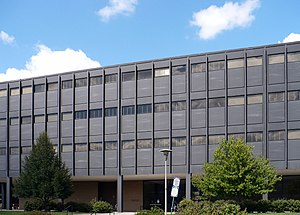
The Bayer School of Natural and Environmental Sciences (BSNES) is a fully accredited degree-granting institution and the primary college of undergraduate and graduate scientific research at Duquesne University in Pittsburgh, Pennsylvania. It was formed in 1994 with the separation of the Biological Sciences, Chemistry, and Biochemistry departments from the former College of Liberal Arts and Sciences, and subsequently named in honor of the Bayer Corporation. The school currently houses the departments of Biological Sciences, Biotechnology, Biochemistry, Chemistry, Environmental Science & Management, Forensic Science & Law, and Physics. The school also collaborates closely with the Duquesne University School of Pharmacy. In 2010, the department of Chemistry and Biochemistry was designated as a Mass Spectrometry Center of Excellence by Agilent Technologies, allowing for collaborative research into metabolics, proteomics, disease biomarkers, and environmental analysis. In 2011, Duquesne University became one of 98 universities nationwide, and one of nine Catholic universities, to be designated as a high research activity institution by the Carnegie Foundation.
Areas of study
Bachelor of Science (B.S.) programs offered
- Biological Sciences
- Biochemistry
- Chemistry
- Environmental Chemistry
- Environmental Science
- Physics, with available concentrations in Astronomy, Condensed Matter, Education, or broad track
Bachelor of Arts (B.A.) programs offered
- Biochemistry
- Physics
Master of Science (M.S.) programs offered
- Biochemistry
- Biological Sciences
- Biotechnology
- Chemistry
- Education
- Environmental Science & Management, with available concentration in Conservation Biology
- Forensic Science & Law
Doctor of Philosophy (Ph.D.) programs offered
- Biochemistry
- Biological Sciences
- Chemistry
Research facilities
Analytical and spectroscopic research

Collaborative arrangements with other basic and applied science departments have led to the joint operation of such facilities as the Sony Microscopy Laboratory featuring transmission and scanning electron microscopes and associated computer imaging facilities, the X-Ray Crystallography Facility, featuring a Rigaku AFC7R diffractometer, two powder diffractometers and associated computing equipment. Designated as a Mass Spectrometry Center of Excellence to Study Diseases and Environmental Issues by Agilent Technologies, the Department of Chemistry & Biochemistry has a research facility equipped with chromatography and spectroscopy instrumentation. Some instruments housed in the facility include:
- Agilent Rapid Resolution liquid chromatograph (LC)
- Agilent HPLC-Chip/MS systems
- Agilent Mass Quadrupole Time of Flight LC/MS
- Agilent Triple quadrupole LC/MS
- Agilent Mass Time of Flight MS
- Two Agilent Gas Chromatography/ICP-MS
- Two Agilent Gas Chromatography/EI/CI-MS
- Gerstel MultiPurpose Sampler equipped with SPME, SBSE, and TDU
- Bruker ESI nanoESI microTOF
- Bruker 400 MHz multinuclear NMR Spectrometer
- Varian 400 MHz and 500 MHz NMR spectrometers
- SGI Itanium-2 supercomputers
- Numerous other spectrophotometric and chromatographic instruments
The center was founded by Dr. Mitch Johnson (1962–2010) and Dr. H.M. "Skip" Kingston of the department of Chemistry & Biochemistry.
Biological research
The Biological Sciences department operates the Center for Metals in Biological Systems, which was designed to "provide a center of expertise in metals in natural and synthetic materials focused on structure-function relationships and the development of new applications." The center is operated by Dr. Partha Basu of the department of Chemistry and Biochemistry.
Computational sciences
The Institute for Computational Sciences is an interdisciplinary organization of faculty members, postdoctoral fellows, graduate and undergraduate students from the Departments of Chemistry and Biochemistry, Physics, Mathematics, and Computer Sciences. The institute was founded with the purpose of "consolidating expertise at Duquesne University that fosters interdisciplinary research in computational sciences, provides novel educational experiences for students, and creates joint funding opportunities."
Microwave assisted chemistry
The Center for Microwave and Analytical Chemistry (C/MAC) is a chemical research center founded by Dr. H.M "Skip" Kingston and the Bayer School of Natural and Environmental Sciences. The Center is dedicated to collaborative research, technology transfer and professional education in microwave, environmental, and analytical chemistry, sample preparation and analysis. The Center "solves real problems and meets analysis needs through fundamental, practical, and innovative research and transfers these technologies and methodologies to national and international laboratories and industry."
Biotechnology
The Center for Biotechnology is an interdisciplinary organization of researchers from the Duquesne University School of Pharmacy, the Bayer School of Natural and Environmental Sciences, and the Rangos School of Health Sciences. Its mission is to enhance the innovative development and application of biotechnology through an interdisciplinary, coordinated research effort across the University, thereby contributing to society and the improvement of the quality of life. Priorities for the Center include: increasing connectivity both within and outside of Duquesne University, providing collaborative research programs and grant proposals, providing seminars and educational programs supporting translational science, and the improvement of core infrastructure. Specific areas of interest include devices and diagnostics, drug discovery, drug delivery, gene therapy, bioremediation, bioinformatics, microbial engineering, analytical methods, pharmaceutics, compliance, and rehabilitation.
Administration
Office of the Dean
Dr. Philip Reeder, Dean
Department of Biological Sciences
Dr. Joseph R. McCormick, Chair
Center for Biotechnology
Dr. Alan W. Seadler, Director
Department of Chemistry and Biochemistry
Dr. Ellen Gawalt, Chair
Center for Environmental Research and Education
Dr. John F. Stolz, Director
Department of Forensic Science and Law
Dr. Frederick W. Fochtman, Director
Department of Physics
Dr. Simonetta Frittelli, Chair
References
- "IIT College of Architecture".
- "PreMed". Archived from the original on 2011-07-19. Retrieved 2011-02-12.
- "Duquesne, Agilent Launch Mass Spec Center of Excellence". 11 March 2010.
- "Carnegie Foundation Validates Strength of Research at Duquesne". Duquesne University Times. Duquesne University. February 9, 2011. Archived from the original on July 30, 2012. Retrieved February 12, 2011.
- "Chemistry and Biochemistry". Archived from the original on 2011-05-04. Retrieved 2011-02-12.
- "Agilent | Duquesne University, Agilent Technologies Establish Mass Spectrometry Center of Excellence to Study Diseases, Environmental Issues". 2010-03-10.
- "Chemistry and Biochemistry". Archived from the original on 2011-05-05. Retrieved 2011-02-12.
- "Chemistry and Biochemistry". Archived from the original on 2011-05-05. Retrieved 2011-02-12.
- "Chemistry and Biochemistry". Archived from the original on 2011-05-05. Retrieved 2011-02-12.
- "Research Centers". Archived from the original on 2011-07-19. Retrieved 2011-02-12.
- "Home". Archived from the original on 2010-10-05. Retrieved 2011-02-12.
- Undergraduate Catalog 2007-2008. Pittsburgh, Pennsylvania: Duquesne University. p. 133.
